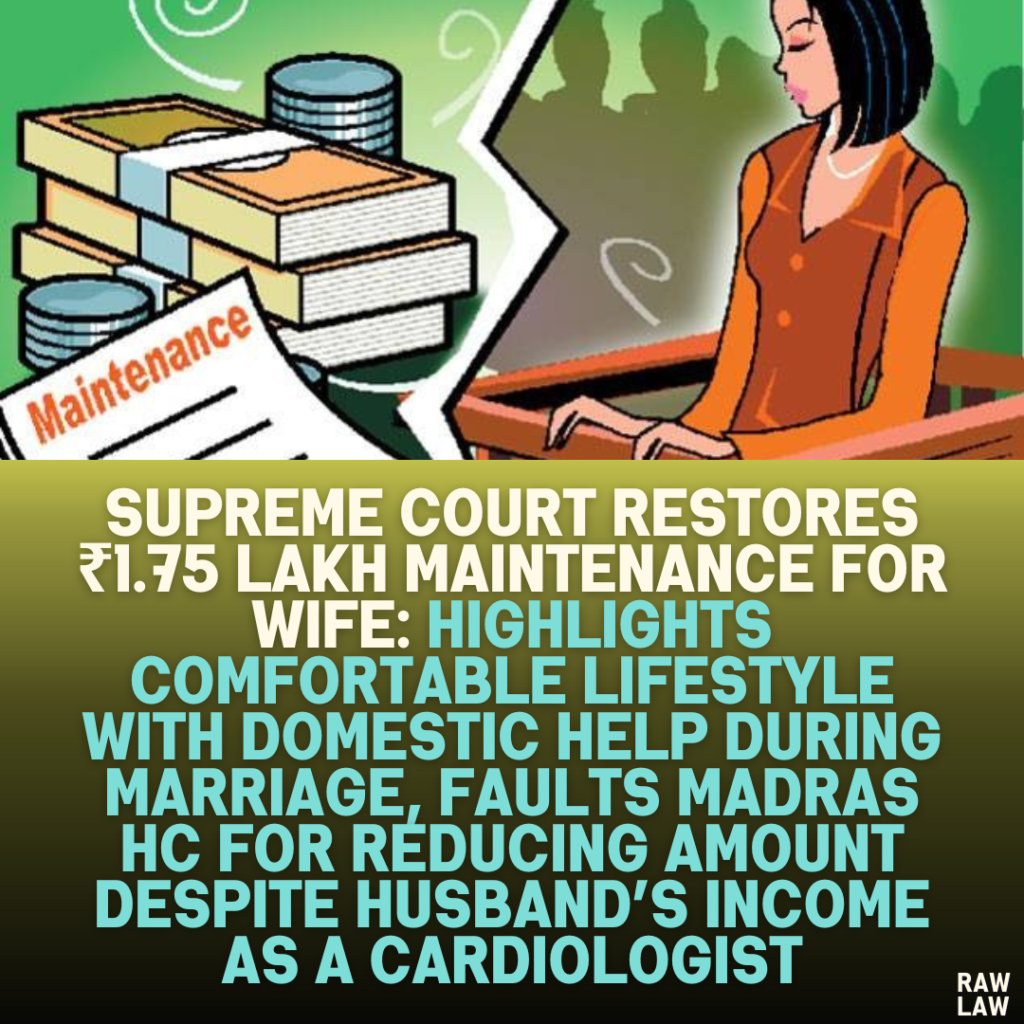Court’s Decision:
The Supreme Court allowed the appeal of the wife, setting aside the Madras High Court’s order, which had reduced interim maintenance to ₹80,000 per month. It restored the Family Court’s award of ₹1.75 lakh per month, directing the respondent husband to pay the amount from the date of the original petition. The Court emphasized that the appellant was entitled to maintain a standard of living consistent with her lifestyle in the matrimonial home during the pendency of divorce proceedings.
Facts:
- The marriage between the appellant (wife) and the respondent (husband) was solemnized in 2008 under Christian customs.
- The respondent had one child from his previous marriage, but the couple had no children together.
- Relations deteriorated, leading to the husband filing for divorce in 2019, citing cruelty and incompatibility.
- During the proceedings, the wife sought ₹2.5 lakh as monthly maintenance, claiming the husband’s significant income from professional practice, rental income, and other assets.
- The Family Court awarded ₹1.75 lakh per month as interim maintenance, noting the husband’s substantial financial capacity.
- On appeal, the Madras High Court reduced the amount to ₹80,000, citing limited income sources. The appellant wife challenged this decision before the Supreme Court.
Issues:
- Did the Madras High Court err in reducing the interim maintenance from ₹1.75 lakh to ₹80,000 per month?
- Was the maintenance awarded by the Family Court justified considering the respondent’s financial capacity and the appellant’s standard of living?
Petitioner’s Arguments:
- The appellant contended that the Family Court’s award of ₹1.75 lakh was reasonable, given the respondent’s high earnings and ownership of multiple properties.
- She argued that the High Court failed to consider the Family Court’s findings on the respondent’s undisclosed income and assets.
- She maintained that she had sacrificed her career post-marriage and was entitled to maintenance reflecting her marital standard of living.
Respondent’s Arguments:
- The respondent claimed that the Family Court overestimated his income by including non-existent or overstated sources, such as joint ventures and property income.
- He argued that his primary income was limited to ₹1.25 lakh per month from his job as a cardiologist and half of ₹2.73 lakh rental income shared with his aged mother.
- He sought a further reduction in maintenance, asserting his financial constraints.
Analysis of the Law:
- Interim maintenance is governed by the principle of ensuring that the spouse claiming maintenance maintains a lifestyle consistent with the matrimonial standard of living.
- The respondent’s failure to disclose his complete financial status weighed against him, as courts emphasize full disclosure in maintenance proceedings.
- Maintenance amounts should reflect the earning spouse’s financial capacity, assets, and liabilities, alongside the non-earning spouse’s dependency and lifestyle.
Precedent Analysis:
The Supreme Court aligned its decision with established principles, emphasizing:
- A spouse’s entitlement to maintain the standard of living enjoyed during marriage.
- The burden on the earning spouse to disclose complete financial details in maintenance proceedings.
- That courts must holistically evaluate financial capacity, including both direct income and assets.
Court’s Reasoning:
- Family Court’s Findings: The Family Court had conducted a detailed assessment of the respondent’s financial situation. It noted:
- The respondent’s significant professional income as a cardiologist.
- Additional income from properties in Cochin and Chennai.
- Possession of multiple assets and a school, despite claims of financial losses.
- High Court’s Approach: The Supreme Court found that the High Court overlooked critical aspects:
- It focused only on the respondent’s salary and rental income from one property, ignoring the broader financial picture, including the respondent’s ownership of multiple properties and other ventures.
- It did not address the respondent’s failure to provide complete financial disclosures, such as income tax returns.
- Lifestyle and Dependency: The Court underscored the appellant’s non-working status, which resulted from her sacrifice of a career post-marriage. It emphasized that she was accustomed to a comfortable lifestyle, with domestic help and other amenities provided during the marriage, which justified the maintenance amount awarded by the Family Court.
Conclusion:
The Supreme Court reinstated the Family Court’s award of ₹1.75 lakh per month as interim maintenance, holding that the appellant was entitled to maintain her standard of living during the pendency of the divorce proceedings. The appeal filed by the respondent husband was dismissed.
Implications:
- For Maintenance Law: The judgment reinforces the principle that interim maintenance must align with the standard of living in the matrimonial home. It also reiterates the duty of the earning spouse to disclose complete financial details.
- For Financial Transparency: The decision highlights the consequences of incomplete financial disclosures, as courts will rely on available evidence and adverse inferences in such cases.
- For Spousal Rights: The ruling serves as a reminder of the entitlement of a non-earning spouse to adequate financial support, reflecting their marital standard of living, even during disputes.
The case sets a significant precedent in ensuring fairness in maintenance determinations while holding earning spouses accountable for full financial transparency.
